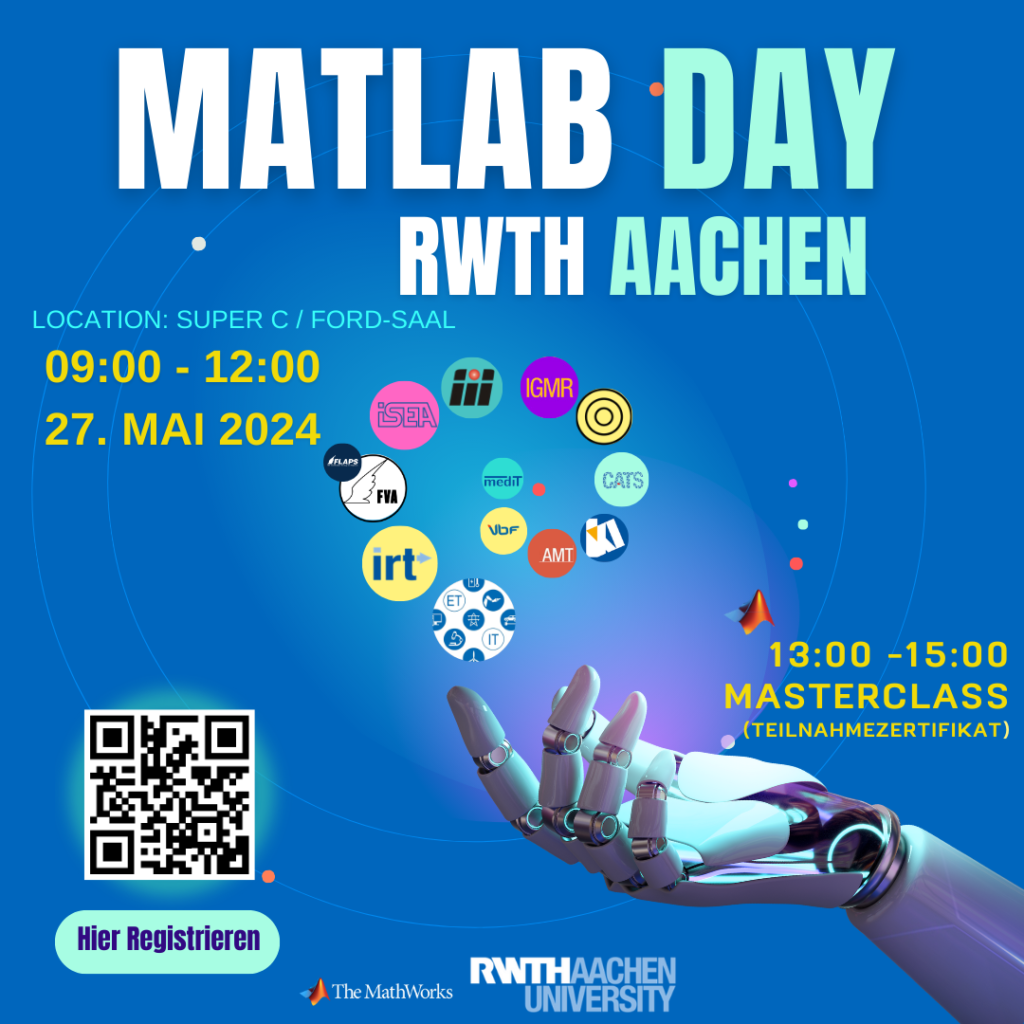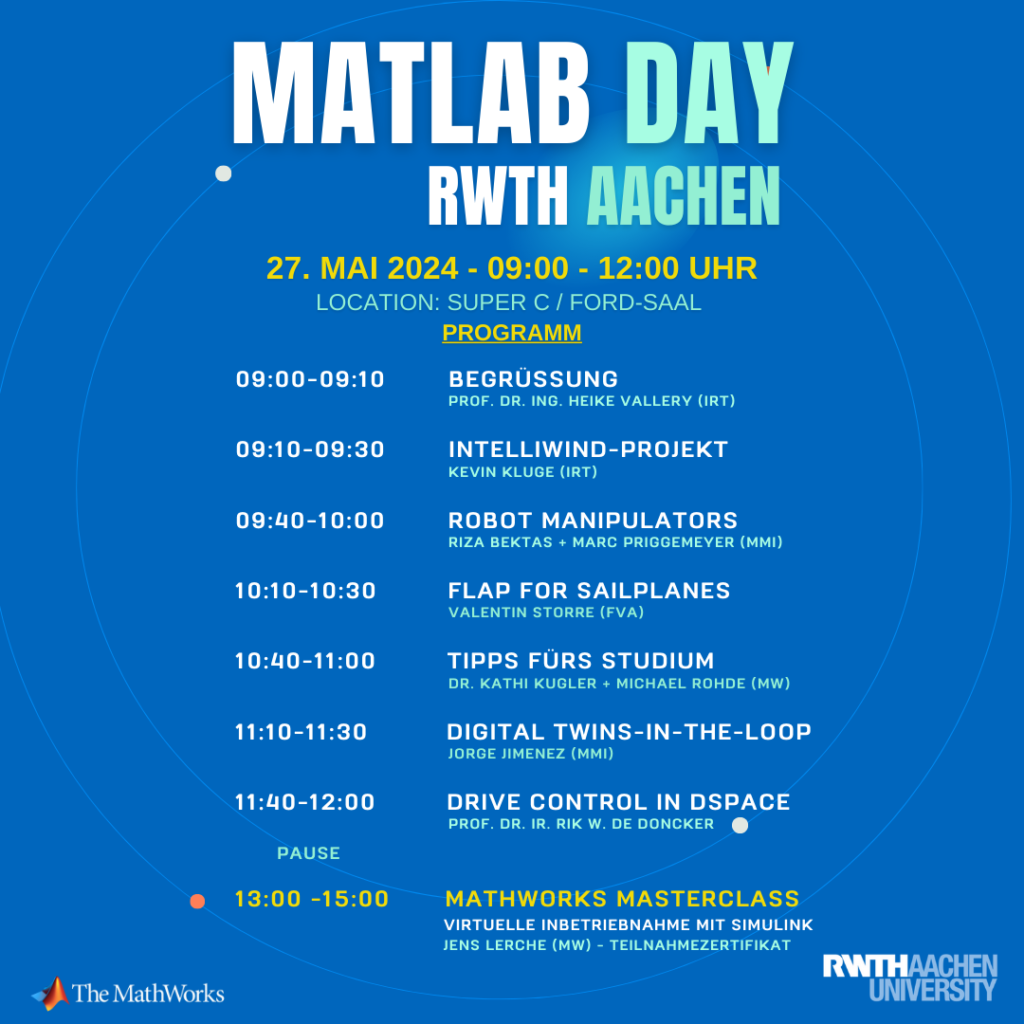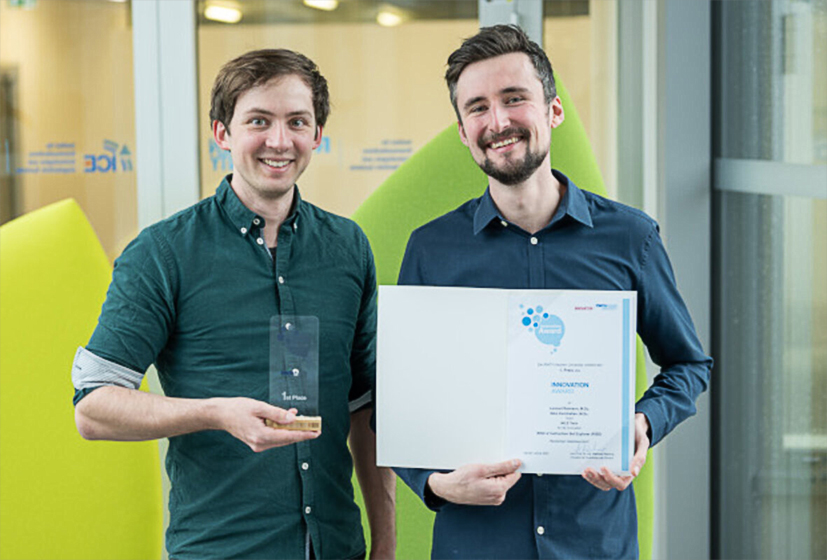Kategorie: ‘Allgemein’
ITAR team from the Chair of Distributed Signal Processing presented research project at the Hannover Expo
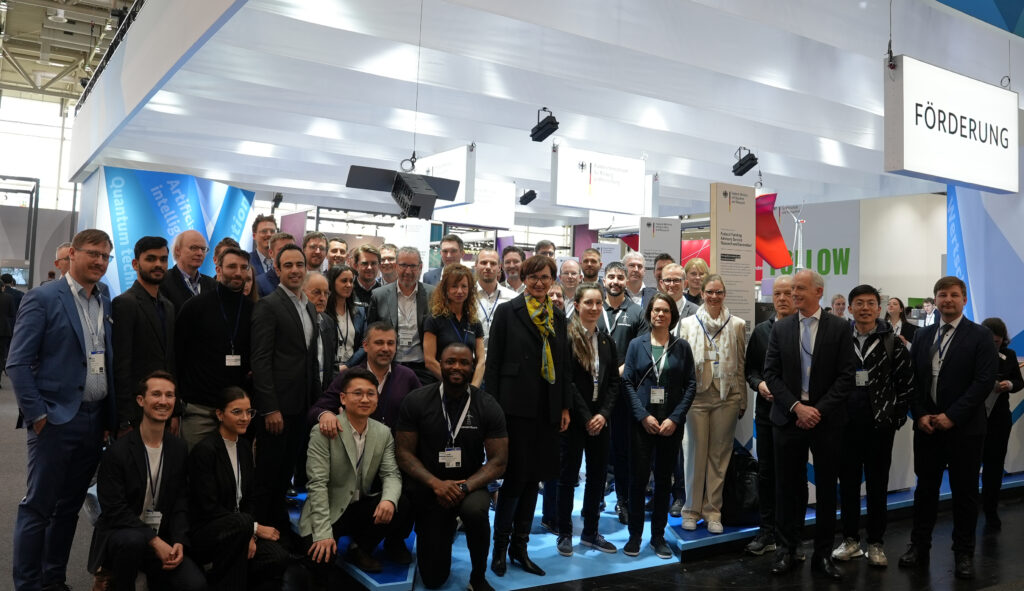
© Chair of Distributed Signal Processing
One of our chairs was also represented at the Hannover Messe this year. The ITAR team (Innovative Test Methods for Radio Systems Based on Augmented Reality Technologies) presented the cutting-edge research of the start-up from the Chair of Distributed Signal Processing at the stand of the Federal Ministry of Education and Research (BMBF) at the Hannover Expo in April.
ITAR, a branch of the 6G Research Hub, is funded by the Federal Ministry of Education and Research as part of the Startup.Connect programme. The team welcomed Minister Bettina Stark-Watzinger from the BMBF and State Secretary Prof Dr Sabine Döring as guests. Students, engineers and managing directors took the opportunity to see the team’s innovative solutions and share them with leading industry representatives. This prepared the way for future collaborations. We would like to thank the BMBF, familie redlich A.G. and the team at the Karlsruhe project management organisation for their support.
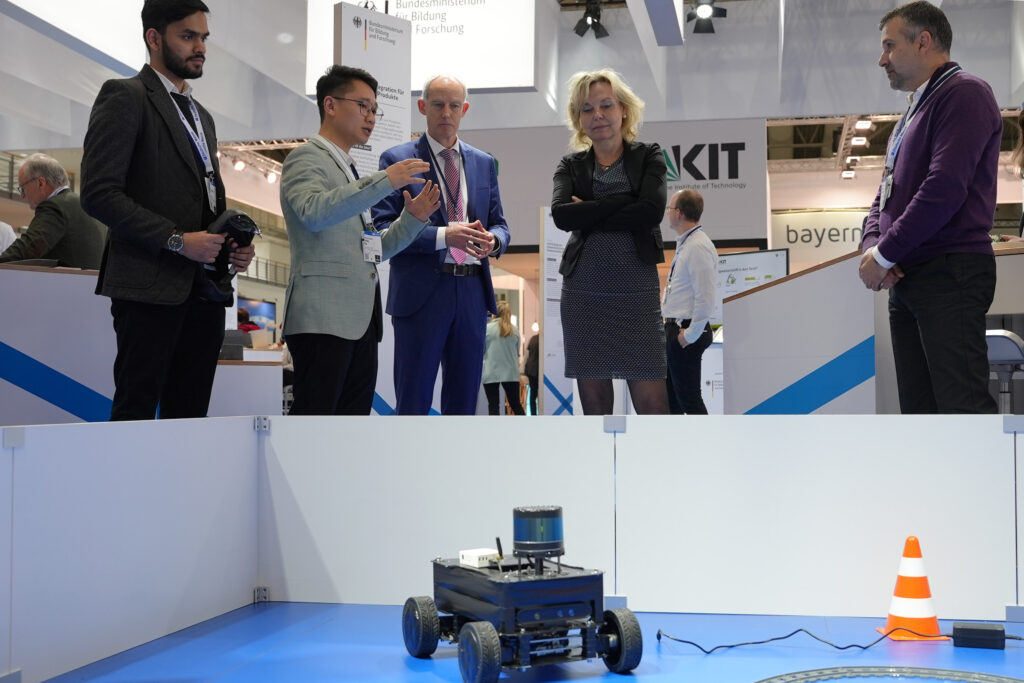
© Chair of Distributed Signal Processing
Further information on ITAR can be found on the chair’s website.
Tim Brimmers: Winner of the SEW-EURODRIVE Foundation Study Award 2023
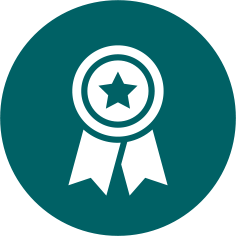
Congratulations to Tim Brimmers, who will be awarded the 2023 Study Prize worth 2,500 euros at the Ernst Blicke Award Ceremony on 17 May 2024.
The Executive Board of the SEW-EURODRIVE Foundation selected Mr Brimmers as the winner in order to fulfil the Foundation’s purpose of honouring and making visible outstanding academic achievements of young people.
We, the Faculty of Electrical Engineering and Information Technology, are very proud to have such outstanding candidates as Tim Brimmers in our ranks.
Excellent researchers on an interdisciplinary stage: lecture by Professor Monti
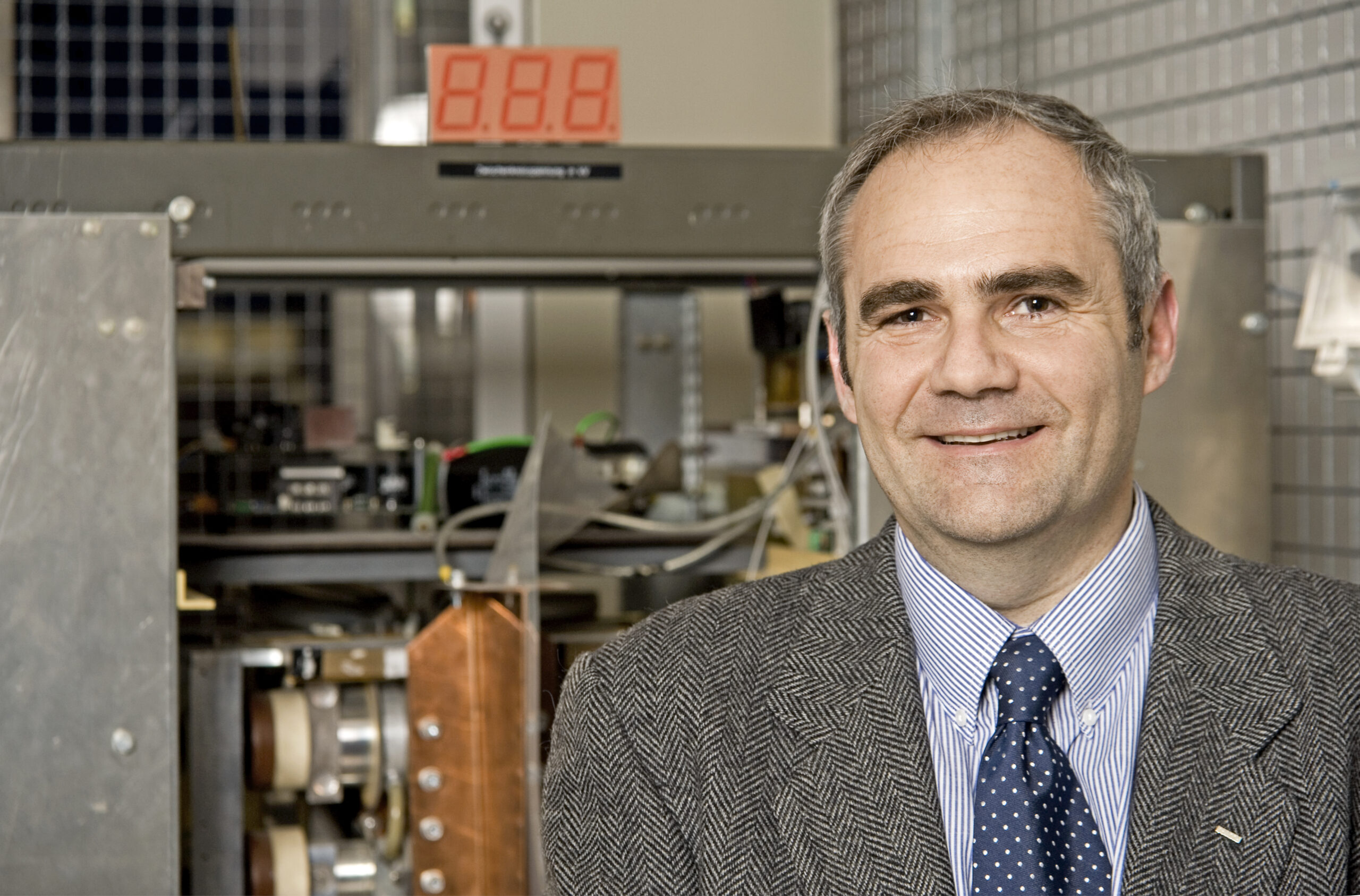
© Peter Winandy
On 17 April, Professor Antonello Monti of RWTH Aachen University will speak at the scientific meeting of the engineering and economics class of the “Nordrhein-Westfälische Akademie der Wissenschaften und der Künste” about the development goals of his discipline in terms of solving major societal challenges.
Against the background of the international situation, the energy transition process is more important than ever.The necessary technological transformation of the energy system must be approached from two angles: On the one hand, a new major player in energy supply has emerged: renewable energy. On the other hand, there are new consumers such as electromobility and heat pumps. Digitalisation is proving to be a key enabler in this process. You could even say that digitalisation is not an option, but a necessity. The power system is consequently becoming a large, programmable cyber physical infrastructure with a high level of complexity. In his presentation “The Digitalisation of the Energy Systems: from the electrons to the cloud”, Professor Monti addresses this complexity by analysing the solutions currently being developed for the different levels of the infrastructure.
” Rethinking the whole architecture means reconsider the basic principles of operation of the new power system but also the corresponding IT systems”,
announced Professor Monti, Director of the Institute for Automation of Complex Power Systems (ACS).
So what does it mean to run a digital grid? And will we be able to build a digital grid that is as reliable as the current infrastructure?
The solutions he proposes in his presentation are the result of concrete experience from large European research projects. Professor Monti leads a research group with about 50 full time scientists working intensively on the the border between energy and information and communication technologies. He is responsible for coordinating some of the most relevant European projects in this field, such as OneNet, TwinEU und int:net. His research work has received several awards, including the prestigious “IEEE Field Medal Award for Innovation in Public Infrastructure” and the “NRW Innovation Award”.
In another presentation – “Sustainable metals: contributions from basic research” – Professor Dierk Raabe from the Max Planck Institute for Sustainable Materials will address the question of whether we can succeed in decarbonising a key industry with “green steel”.
Further information on the Nordrhein-Westfälische Akademie der Wissenschaften und der Künste can be found on the organisation’s homepage.
Excellent results at the Workshop Biosignals 2024
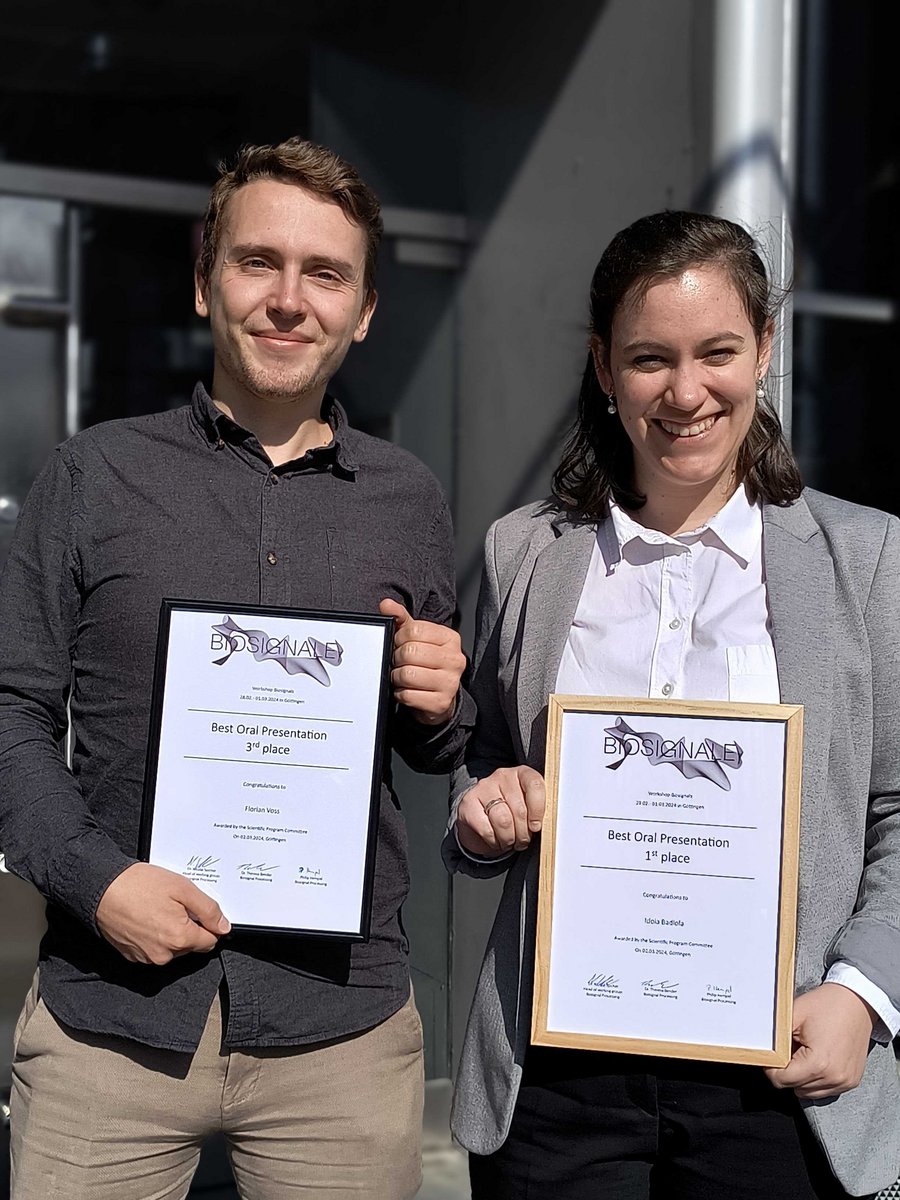
© Medical Information Technology (MedIT)
Idoia Badiola and Florian Voss from the Chair of Medical Information Technology (MedIT) at the Helmholtz Institute for Biomedical Engineering at RWTH Aachen University successfully participated at the Workshop Biosignals 2024, which took place from 28th February to 1st March in Göttingen.
The technical committees “Biosignals” and “Magnetic Methods in Medicine” of the German Society for Biomedical Engineering cordially invited all interested scientists, especially from the field of early career researchers, to the Workshop Biosignals.
Accepting the challenge Idoia was awarded the 1st place in the category “Best Oral Presentation” for her presentation “Mapping of peripheral venous hemodynamics using a low-cost camera: a proof-of-concept”. Florian achieved the 3rd place with his presentation “Camera Fusion for Improving Body Part Segmentation of Preterm Infants”.
“Congratulations to our colleagues Idoia Badiola and Florian Voss on their outstanding achievements”,
commented MedIT.
With this event, the committees are continuing a more than 20-year tradition of successful collaboration. Important components of the workshop were keynote speeches by young scientists as well as detailed poster presentations with short talks in which each submitted paper could be discussed constructively and critically. Submissions on biosignal analysis, biomagnetism and new related topics such as artificial intelligence and medical data science were welcome.
The event was hosted by the Biosignal Processing Group of the University Medical Centre Göttingen and supported by the Medical Image- and Signal Processing Working Group of the German Association for Medical Informatics, Biometry and Epidemiology.
“Special thanks go to the organisation team of the workshop, particularly Dr. Nicolai Spicher, Theresa Bender and Philip Hempel”,
added the Chair of Medical Information Technology.
Further information on the Workshop Biosignals can be found on the event’s homepage.
Find out more about the Chair of Medical Information Technology (MedIT) here.
BMBF supports “SPEED” project by Dr Weihan Li
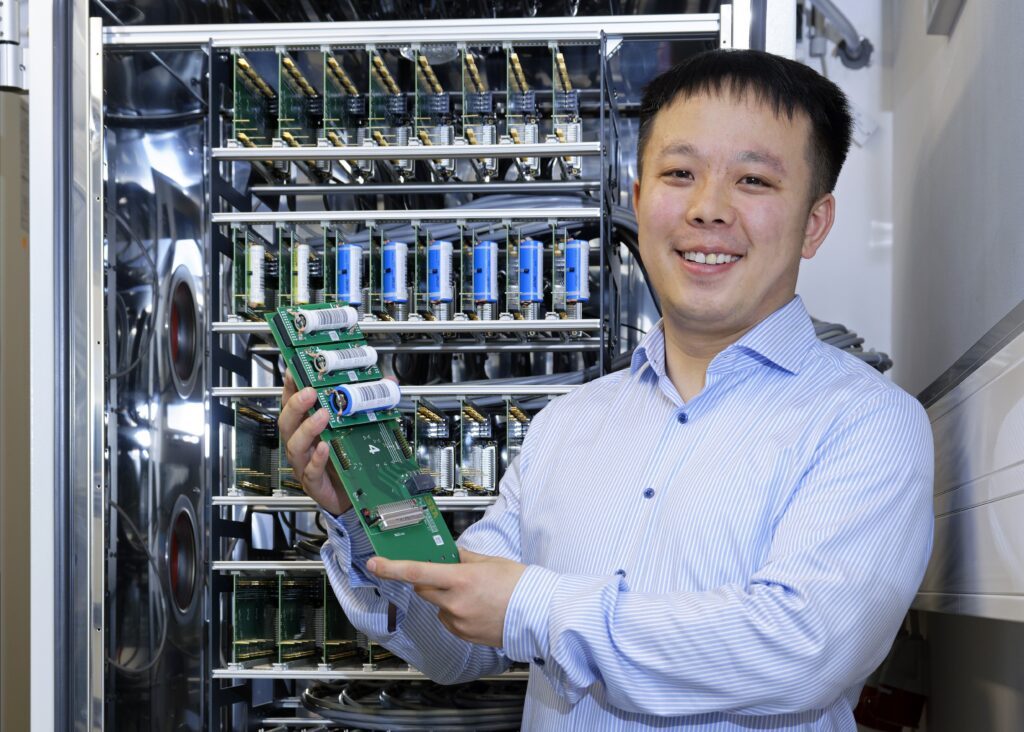
Dr. Weihan Li © Peter Winandy
The German Federal Ministry of Education and Research (BMBF) is funding Dr Weihan Li’s project “SPEED” – Rapid characterisation of the performance of lithium-ion batteries from the production line using machine learning” with 1.85 million euros over the next five years as part of its “BattFutur – Young Investigators Group Battery Research” competition.
At the Center for Ageing, Reliability and Lifetime Prediction of Electrochemical and Power Electronic Systems (CARL) at RWTH Aachen University, the junior research group ‘Artificial Intelligence for Batteries’ is pioneering the development of approaches to automate, digitalise, and accelerate the evaluation of battery performance from production lines using machine learning.
The ‘BattFutur’ funding initiative is part of the ‘Battery Research Factory’ concept, which is embedded in the ‘From Material to Innovation’ framework programme. This programme is a central pillar of the German government’s high-tech strategy. To attract excellent scientists in the field of battery technology to German science and industry, optimal starting conditions must be created. Therefore, promoting young scientists is essential.
Dr Weihan Li has led his junior research group since graduating with honours in Electrical Engineering and Information Technology from RWTH Aachen University in 2021. He completed his Master’s degree in Automotive Engineering and Transportation at RWTH in 2017, after earning his Bachelor’s degree in Automotive Engineering at Tongji University in 2014. Throughout his academic career, Dr Li has conducted research at esteemed institutions such as Imperial College London, the University of Oxford, and the Massachusetts Institute of Technology. He has received numerous awards, including the German Study Prize of the Körber Foundation, the Reichart Prize of the Akademie Gemeinnütziger Wissenschaften zu Erfurt, the vgbe Innovation Prize, the RWTH Innovation Prize, and the Battery Young Research Award.
Institute for Power Electronics and Electrical Drives (ISEA)
Student of the year 2024: Contimi Kenfack Mouafo
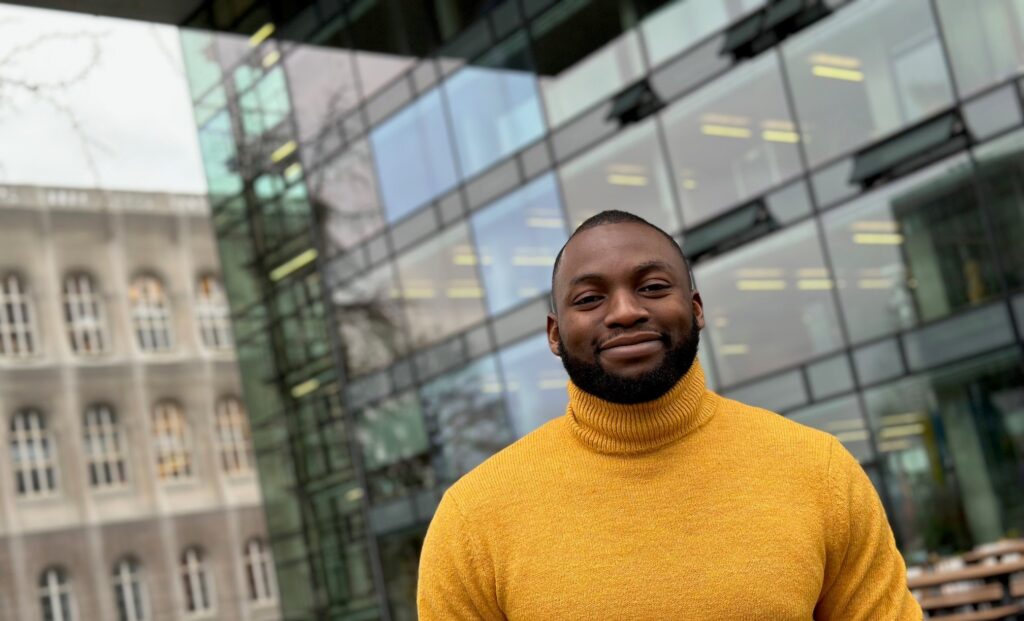
Contimi Kenfack Mouafo is Student of the Year 2024. © Thorsten Karbach
The German University Association has awarded the title of ‘Student of the Year 2024’ to an outstanding young man who is studying Electrical Engineering and Information Technology at RWTH and is involved with the ‘3 E’s 4 Africa’ association. Congratulations to him!
Contimi Kenfack Mouafo is a passionate advocate for the potential of young people in Africa. He campaigns against climate change with innovative projects and aims to correct the negative image of his home continent.
“We must show that African countries are different from the negative stereotypical images that are constantly conveyed.”, says Contimi Kenfack Mouafo.
The association ‘3 E’s 4 Africa’ promotes projects that focus on sustainable fertiliser production from green hydrogen in Namibia and more efficient biogas plants for small farmers in Ghana. The organisation’s name stands for Education, Empowerment and Ecofriendliness.
At the age of 19, the student came to Germany to study and became active in Engineers Without Borders. Later, he founded the ‘3 E’s 4 Africa’ association, where he has been the Chairman of the Board ever since. The association aims to support African students who are working on local education and research projects related to energy transition, combating climate change, and climate change adaptation. German students also contribute to this objective.
The organisation promotes research projects that are environmentally friendly and tackle local challenges while developing African solutions. They network those involved and support independent action by African partners. Additionally, the organisation contributes to the integration of international students at German universities.
Mr Kenfack Mouafo will be honoured as ‘Student of the Year 2024’ at the ‘Gala of German Science’ in Berlin on 25 March for his inspiring commitment. The German Student Union (DSW) and the German University Association (DHV) will present him with the award, which is endowed with 5,000 euros. The Faculty of Electrical Engineering and Information Technology congratulates Mr Kenfack Mouafo on his achievement and wishes him all the best for the future!
Information about the association “3 E’s 4 Africa e. V.” can be found here.
Empowering Tomorrow: International Symposium on Advanced Battery Power – “Kraftwerk” Battery

© Katharina Uhlig
The international symposium ‘Advanced Battery Power – Kraftwerk Batterie’ will take place on 10th and 11th April 2024 at the MCC in Münster. The event will provide valuable insights into the current state of the art and the future of battery technology. Advanced Battery Power is a collaborative effort between HDT (Haus der Technik), Germany’s oldest technical training institute, the Institute for Power Electronics and Electrical Drives (ISEA) at RWTH Aachen University, the MEET Battery Research Centre at the University of Münster, and the Helmholtz Institute Münster at Forschungszentrum Jülich.
The conference in Münster will discuss the trends that will shape battery research, production, and use in the world of today and tomorrow. The topics covered will include sustainability, circular economy, recycling, and next-generation battery systems. These systems will rely on data-based solutions and artificial intelligence to improve their performance.
In an expert interview, Prof. Dr Dirk Uwe Sauer, Professor of Electrochemical Energy Conversion and Storage Systems, explains where we stand in terms of vehicle battery technology and what manufacturers and researchers are currently working on (Only available in German).
The event will be a hybrid conference, allowing for both in-person and online participation. In 2024, Advanced Battery Power will be included in the HDT Battery Conference, providing valuable battery expertise. Additionally, there will be the German-language Battery Day NRW on 9 April 2024 and ten accompanying online seminars. The Vehicle to Grid conference will also take place in Münster from 10 to 11 April 2024.
Additional programme details and registration information can be found here.
Max Lemme receives RWTH Fellow award
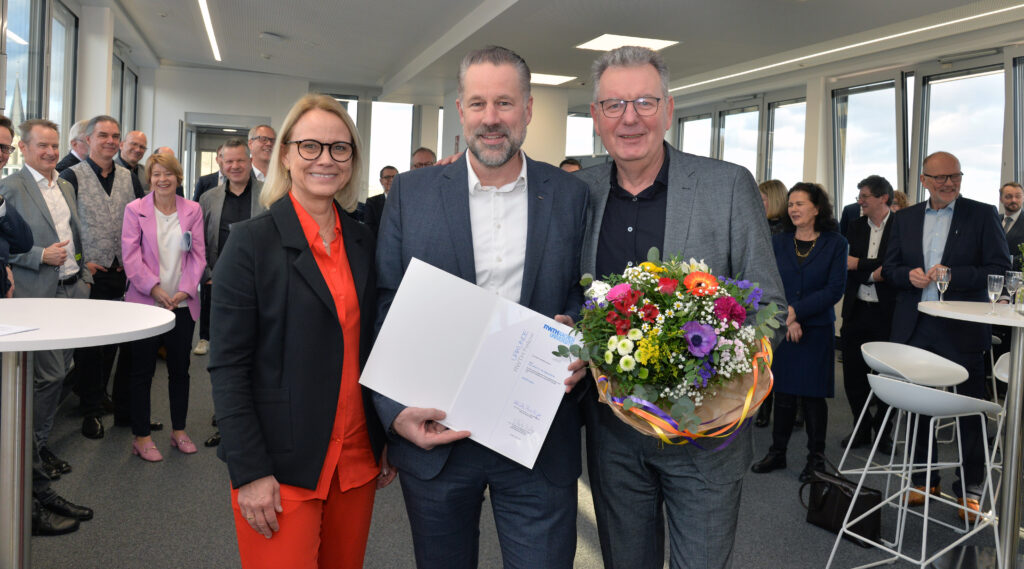
Vice Rector Sabine Brück (left) and Vice Rector Matthias Wessling (right) honour Professor Max Lemme as RWTH Fellow. Photo: Andreas Schmitter
Professor Max Lemme, head of the Department of Electronic Devices, and Professor Harald Müller, head of the Department of Medieval History, are new RWTH Fellows. With this title, the RWTH Aachen University honours professors who have distinguished themselves in research and have rendered outstanding services to the RWTH Aachen University.
Professor Max Lemme is a highly respected expert in the field of devices based on 2D materials and enjoys international recognition. One of his major achievements is a study on a graphene-based field-effect transistor, which has been cited 1353 times to date. He has successfully obtained research funding, including an ERC Starting Grant in 2012 and a Proof of Concept Grant from the European Research Council in 2018. He was also awarded a prestigious Heisenberg Professorship by the German Research Foundation in 2012. Max Lemme was instrumental in the establishment of the NeuroSys Cluster of Excellence and is its spokesperson. He is also an expert reviewer for the European Community and regularly participates in major conferences in the field of semiconductor devices, including IEDM, ESSDERC, DRC and ULIS.
The award he holds was introduced as part of the Excellence Initiative in 2013 and is based on nominations from the Deans of the Faculties.
Click here to go to the website of the Chair of Electronic Components.


